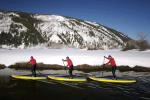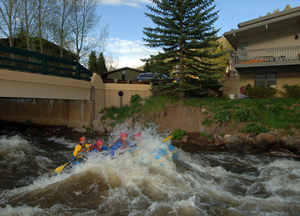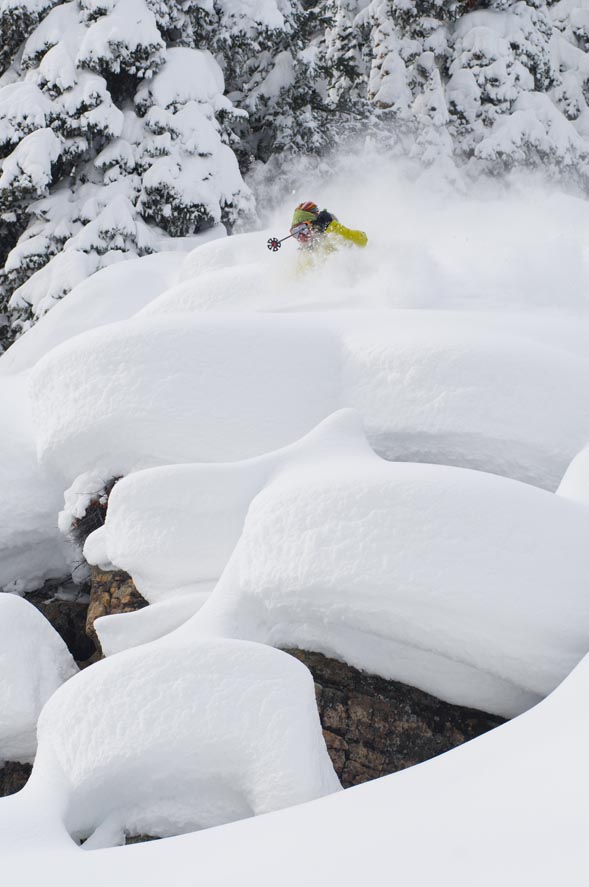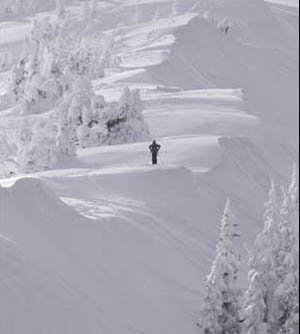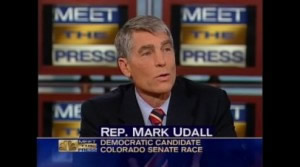
Udall needs to stick to his guns on federal Renewable Electricity Standard
June 6, 2009 —
Colorado Sen. Mark Udall Thursday first introduced than pulled back an amendment that would have strengthened a proposed national Renewable Electricity Standard (RES) of 15-percent renewable electricity for all utilities by the year 2021.
The RES proposed in the Energy and Natural Resources Committee, which Udall is a member of, would fall short of Colorado’s RES of 20 percent by 2020 — 10 percent of which was mandated by voters in 2004 (Amendment 37), with the other 10 percent imposed by the State Legislature in 2007. Rural electric co-ops are only subject to a 10-percent mandate.
Udall in a release said he pulled back an amendment that would have required 25 percent by 2025 because he knew there still wasn’t enough support for the higher number. He also objected to a stipulation in the RES that 4 percent of a utility’s 15-percent requirement could come from increasing efficiency in existing, conventional power plants.
The RES deliberation is part of the broader American Clean Energy and Security Act, which some environmentalists have criticized as not going far enough in establishing a carbon cap and a renewable standard. The Eldorado Springs Democrat helped get Amendment 37 passed in 2004, and other Colorado lawmakers are expected to play key roles in crafting the current federal bill.
Here’s the statement Udall released Thursday on the RES debate:
“While I’m disappointed that the RES proposed by the Committee today isn’t stronger, it is a small but important step in the right direction toward setting a national goal to increase our renewable energy use. My own home state of Colorado is an example of the potential benefit for the rest of the country. Since 2004, when Colorado’s RES was first approved by voters, more than 3,000 jobs have been created in the wind and solar energy fields alone.
“A federal standard has the power to create hundreds of thousands of renewable energy jobs, while reducing pollution and helping us end our dangerous addiction to foreign fossil fuels. Today, I offered an amendment that would increase the standard to 25 percent by 2025 because I thought it was important to emphasize that there is support on the Committee for a stronger RES. I withdrew the amendment because I knew there was not enough support for it yet among Committee members.
“We still have much work to do on the Energy Bill as well as on the Renewable Electricity Standard. I led the effort to create an RES in Colorado, and I will continue my efforts to create a strong national RES as well. I firmly believe that with a stronger standard, we will be able to lead the world in renewable energy production. But without it, we may see that opportunity pass us by.”
In other Colorado energy news, yet one more rural electric association (REA) is seeing the same sort of board election upheaval going on at REAs across the state (including Holy Cross Energy here in the Vail Valley), where renewable energy advocates are battling status-quo incumbents bent on keeping electric rates low through conventional energy loads.
In a debate in Steamboat Springs Wednesday, two like-minded women running for the Yampa Valley Electric Association board argued reliance on traditional coal-fired and natural gas-fired power plants will eventually lead to rate increases anyway, and that the co-op needs to hedge against those spikes through renewable sources.
According to the Steamboat Pilot and Today newspaper, Susan Holland and Megan Moore-Kemp are challenging incumbents Scott McGill and Charles Perry for seats on the board of a co-op that serves the northern Colorado counties of Routt and Moffat as well as parts of southern Wyoming.
“I think it’s really essential that we start thinking long-term,” said Holland, owner of the solar electric design and installation company Emerald Mountain Energy. “I think we’re artificially holding rates low at this time … My hope is that we get creative about this because we’re going to see higher rates no matter what.”
McGill, who, according to the paper, has solar panels on his own home, said Holland has a conflict of interest because of her solar company and the fact she’s advocating for solar-installation credits and energy efficient appliance rebates. He told the audience no one on the current board is opposed to renewable energy: “It may be a question of how fast we move and who pays for what.”
Similar debates have been going on at REAs around Colorado, including a contentious election for the board of the state’s largest co-op, the Intermountain Rural Electric Association (IREA) on the Front Range, and Holy Cross Energy in the Vail and Aspen area.
Yampa Valley, along with the IREA, Holy Cross and Grand Valley Rural Power Lines out of Grand Junction, is among the state’s four co-ops that aren’t members of Tri-State Generation and Transmission, which is the subject of possible increased state scrutiny and oversight through the Colorado Public Utilities Commission.
Yampa Valley and the other three co-ops get the majority of their power from Xcel Energy, which is subject to a 20-percent renewable standard by 2020. Tri-State and the rest of the state’s co-ops are only subject to a 10 percent renewable requirement by 2020.
These are some of the most critical elections going on in the state, but the process is massively under-publicized and consumers for years have been far too complacent in vetting the best possible candidates.
![]() Comment on "Udall needs to stick to his guns on federal Renewable Electricity Standard" using the form below
Comment on "Udall needs to stick to his guns on federal Renewable Electricity Standard" using the form below





